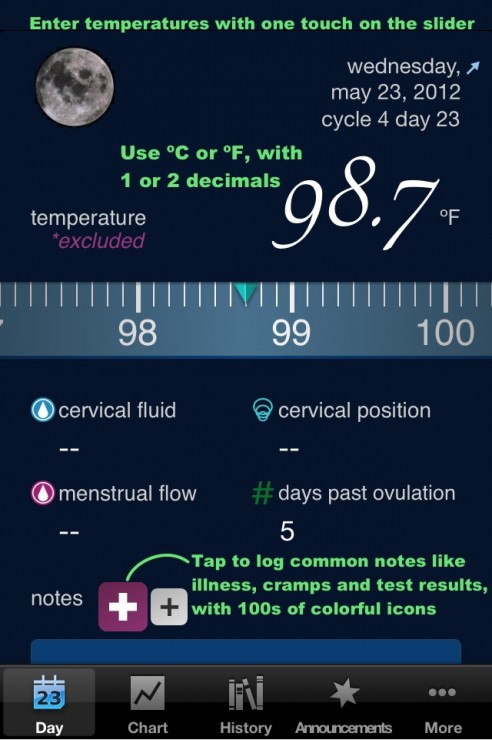Hanging out (mostly virtually) with so many researchers at the Society for Menstrual Cycle Research, I find myself thinking of research topics I’m curious to see explored. Here are just two that have crossed my mind recently:
1. Who is using menstrual cycle tracking apps and why?
There are so many on the market that this period technology recently garnered it’s own story at The Cut. The story notes that Period Plus “claims more than a million users.” Kati Bicknell, co-founder of Kindara has blogged at re:Cycling , and Amy Sedgewick reviewed another new charting app, Selene, just a few weeks ago. Now, Justisse Healthworks for Women has launched their app to support women using the Justisse fertility awareness charting method.
So why and how are women using these cycle tracking apps? For pregnancy achievement, avoidance or both? For fun?
In No Pill? No Prob. Meet the Pullout Generation , also at The Cut, Ann Friedman says that some women are quitting the pill and relying on period-tracker apps, condoms, and the pullout method for birth control.
Are others downloading the apps to learn fertility awareness or were they already charting their cycles before using an app? Are app users more or less inclined to seek out a qualified fertility awareness instructor? And how are women’s attitudes about their periods influenced by cycle tracking apps?
2. Who is quitting hormonal birth control and why?
The popularity of cycle tracking apps suggests some kind of trend away from hormonal methods, and dissatisfaction with side effects prompts many women to look for alternatives. As Friedman wrote in the “pull-out generation” piece mentioned above:
“But I know a dozen women in their late twenties and thirties who, after years of jumping from brand to brand and always feeling crazy or depressed, or after years of nagging health concerns about taking hormones, finally said ‘enough’ and told their partners to put on a condom and deal with it.”
Are there common factors that prompt women to stop using hormonal birth control (HBC)? What kind of support are they finding from health-care providers, partners, friends and family for this decision? Are their identifiable barriers to accessing information, support and services to use non-hormonal contraceptive methods? What do women consider to be their alternatives? Condoms? Cycle tracking apps? Diaphragm? Copper IUD? Fertility Awareness Based Methods? Where are they finding services? Are they finding services? What is positive about quitting HBC? What is negative about the experience?
Wouldn’t it be interesting to see research papers on these topics presented at the next SMCR conference in Boston, June 2015?



Well, one unfortunate thing is that many of them are using simple period trackers and calculations, rather than actually charting other fertility signs. I love seeing the trend going that way, but I hate that it is still so misunderstood, even by those using these “methods.”
I have also heard an increasing number of couples using fertility monitors and OPKs off-label for pregnancy prevention. See https://nfp.marquette.edu.
From what I can tell, this seems to be used as an alternative to more involved fertility awareness based methods. The advantage is that such use is less involved and completely objective, even though somewhat less accurate than traditional FABMs.
Europe already has similar monitors designed for pregnancy prevention, but FDA approval is apparently too onerous to get them here.